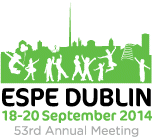
53rd Annual ESPE (ESPE 2014)
Dublin,
Ireland
18 Sept 2014 - 20 Sept 2014
Dublin, Ireland; 18-20 September 2014.
Further information



